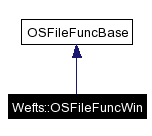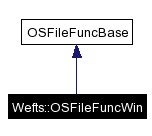

#include <wefts_coffee_win.h>
Inheritance diagram for Wefts::OSFileFuncWin:


This class is able to understand if the underlying system is capable to do asynchronous file or network operations via OVERLAPPED files; this is possible only with Windows 2000 or later, and only if the target file is not a memory-based character file (that is, a CONSOLE).
If the asynchronous file operations are available, they are used to cleanly cleanup the thread in case of cancellation. If they are not available, two actions may be taken: if cancellation is not allowed in the underlying windows specific OSTAIL, the a blocking read is performed. If cancellation is allowed, then a new thread is started, and the calling thread puts itself in wait for the I/O thread to terminate. The new thread is created with minimal resources available, and it hasn't any data to be cleaned.
In case of cancellation requests arriving while waiting for I/O thread to terminate, the target thread is canceled with TerminateThread(). This is sayed to be an unsafe method (From MSDN), but chances are for the system not allocating resources to be cleaned; this means that this cancellation scheme should be safe, but since internal documentation of ReadFile or WriteFile functions is not available, we cannot be certain.
Anyhow, whenever possible (i.e. whenever it is demonstrable that the I/O call may return data or error in a reasonable time), turn off cancellation BEFORE calling entering read or write methods.
Instead of instantiating OSFileFuncWin, use the typedef OSFileFunc, that is turned into the correct class depending on the host system.
Public Member Functions | |
| OSFileFuncWin (void *descriptor=0) | |
| ~OSFileFuncWin () | |
| virtual CffStatus | open (std::string filespec, OpenMode openMode=OM_RO, LockMode lockMode=LM_SHARED) |
| virtual CffStatus | create (std::string filespec, CreateMode cMode=CM_ARCHIVE, LockMode lockMode=LM_EXCLUSIVE) |
| virtual void | getDescriptor (void *data) const |
| To get the descriptor, pass a pointer to an integer where the descriptor will be placed. | |
| virtual void | setDescriptor (void *data) |
| To set the descriptor, pass a pointer to the integer. | |
| virtual file_size_t | read (void *buffer, const file_size_t len) |
| virtual file_size_t | write (void *buffer, const file_size_t len) |
| virtual file_size_t | seek (const file_size_t position, const SeekWhence swFrom=SW_FROM_BEGIN) |
| virtual CffStatus | close () |
| virtual void | setStdIn () |
| Use STDIN as the handle of this FileFunc object. | |
| virtual void | setStdOut () |
| Use STDOUT as the handle of this FileFunc object. | |
| virtual void | setStdErr () |
| Use STDERR as the handle of this FileFunc object. | |
Protected Member Functions | |
| file_size_t | internal_rw (void *buffer, const file_size_t len, bool rw, bool bFile) |
Protected Attributes | |
| HANDLE | m_handle |
| HANDLE | m_evtComplete |
| LARGE_INTEGER | m_liSize |
| LARGE_INTEGER | m_liPos |
| bool | m_bOvlFiles |
|
|
|
|
|
|
|
|
Implements Wefts::OSFileFuncBase. |
|
||||||||||||||||
|
Implements Wefts::OSFileFuncBase. |
|
|
To get the descriptor, pass a pointer to an integer where the descriptor will be placed.
Implements Wefts::OSFileFuncBase. |
|
||||||||||||||||||||
|
|
|
||||||||||||||||
|
Implements Wefts::OSFileFuncBase. |
|
||||||||||||
|
Implements Wefts::OSFileFuncBase. |
|
||||||||||||
|
Implements Wefts::OSFileFuncBase. |
|
|
To set the descriptor, pass a pointer to the integer.
Implements Wefts::OSFileFuncBase. |
|
|
Use STDERR as the handle of this FileFunc object.
Implements Wefts::OSFileFuncBase. |
|
|
Use STDIN as the handle of this FileFunc object.
Implements Wefts::OSFileFuncBase. |
|
|
Use STDOUT as the handle of this FileFunc object.
Implements Wefts::OSFileFuncBase. |
|
||||||||||||
|
Implements Wefts::OSFileFuncBase. |
|
|
|
|
|
|
|
|
|
|
|
|
|
|
|
 1.3.7
1.3.7